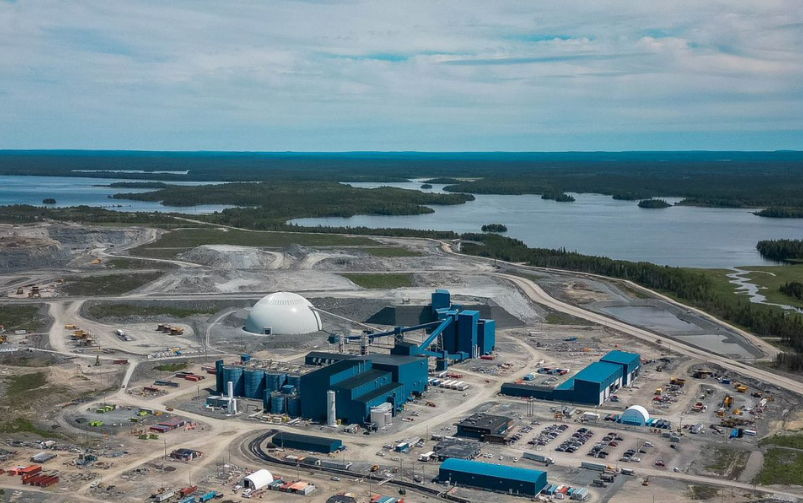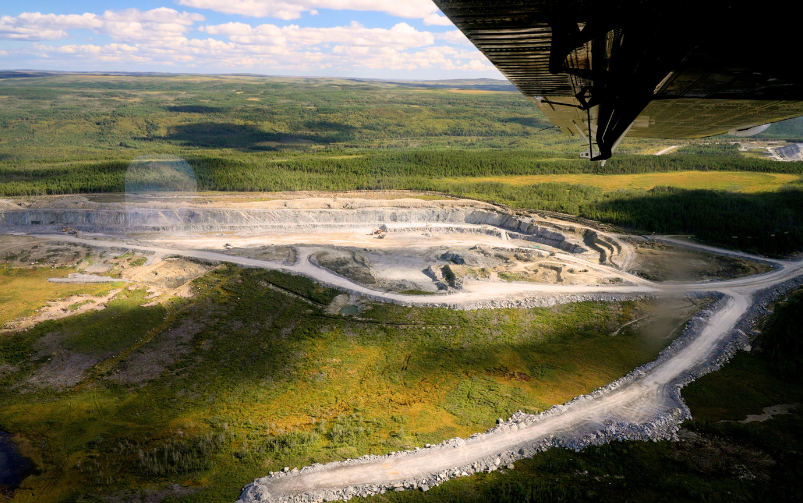As uranium prices skyrocket, operations at Denison’s McClean Lake project will resume in 2025. Courtesy of Denison Mines.
Welcome back to your weekly mining news recap, where we catch you up on some of the news you may have missed. This week’s headlines include Sumitomo Metals’ new stake in FPX Nickel, rare earths potential in B.C.’s coal deposits and rising capital construction costs for B2Gold’s Goose project.
A small aircraft with Rio Tinto workers on board crashed near Fort Smith in the Northwest Territories on Tuesday while on the way to the company’s Diavik diamond mine, as reported by CBC News. Four Diavik mine personnel and two airline crew members died in the crash, while one survivor was transported to Yellowknife’s Stanton Territorial Hospital. The aircraft, registered to Northwestern Air Lease, crashed shortly after take-off, according to the territory’s coroner service.
Uranium prices have risen significantly for the first time in more than 16 years, as reported by Reuters. Prices of uranium oxide have reportedly soared to US$106 per pound this month, marking the current price of uranium as the highest it has been since November 2007. Kazatomprom, Kazakhstan’s state nuclear company and the world’s largest uranium producer, stated that it could potentially cut production due to difficulties sourcing sulfuric acid, an essential ingredient needed to produce the nuclear fuel. The potential for supply shortfalls has prompted increased uranium purchases.
And thanks to the rise in uranium prices, mining operations are expected to resume at the McClean Lake Joint Venture in Saskatchewan in 2025, targeting 800,000 pounds of uranium oxide production for the year, as reported by Mining Weekly. Operations at McClean Lake were suspended in 2008 due to a decline in uranium prices. For the remainder of 2024, the site’s activities will centre around preparing for the mine’s restart. The joint venture is a partnership between Orano Canada and Denison Mines.
Vancouver’s FPX Nickel has officially closed a deal with Sumitomo Metal Mining Canada Ltd., with Sumitomo investing $14.4 million into the company. Following the completion of the deal, Sumitomo will own a 9.9 per cent stake in FPX Nickel. The net proceeds of the deal will be used towards exploration and development activities at the Baptiste nickel project in B.C., ongoing environmental baseline activities, activities related to feasibility studies, and general corporate and administrative purposes.
A study conducted by Geoscience BC has indicated that there could be economic quantities of rare earth elements located in the coal deposits of B.C.’s East Kootenay region, as reported by Business in Vancouver. The project also tested various extraction techniques. As this group of minerals are crucial for the manufacture of numerous technologies, this finding could have identified a viable source of rare earths, especially as B.C. begins to roll out its critical minerals strategy.
Vale has donated a sum of $960,000 over five years to Laurentian University, as reported by Northern Ontario Business. The money will be issued to the Cooperative Freshwater Ecology unit, which was launched in 1989 with a focus on the ecological restoration of northeastern Ontario’s waterways that had been affected by acid and metal damage. The unit has since expanded its research to address climate change, invasive species, trace contaminants and more.
After conducting a review of the overall construction plan for its Goose gold project in Nunavut, Vancouver’s B2Gold revised the total construction capital estimate from $800 million to $1.05 billion, as reported by North of 60 Mining News. The majority of the increase in costs is related to underestimated employment and site operating costs indicated in the project’s feasibility study, in addition to general inflation-related costs. B2Gold stated that the project remains on schedule for first gold pour in the first quarter of 2025.
The CEO of Sayona Mining’s Quebec subsidiary, which operates the North American Lithium (NAL) operation, left the company this week and an operational review of the mine has been launched, as reported by Mining Weekly. Parent company Sayona Mining stated that since global lithium market conditions are rapidly shifting, the review will zone in on opportunities where costs at NAL, the only operating hard rock lithium mine in North America, can be reduced, as well as managing cash flow and ensuring the operation’s financial stability during changing market conditions. Sayona also stated that as part of the review, an additional 14 workers were made redundant.
Mineral processing solutions provider Sedgman has designed a fully electric gold processing plant for Artemis Gold’s Blackwater mine, wrote Lynn Greiner in the December/January issue of CIM Magazine. The plant, located in central B.C., is expected to be commissioned by Artemis Gold during the second half of 2024 and is planned to run for 22 years. Though haulage fleets are often the primary focus for cutting emissions from mining, this plant demonstrates that there are other stages of the extraction process that can be decarbonized.
That’s all for this week. If you’ve got feedback, you can always reach us at editor@cim.org. If you’ve got something to add, why not join the conversation on our Facebook, Twitter, LinkedIn or Instagram pages?




